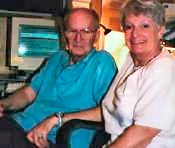Speech Therapy Success after A StrokeHow Mr. Quigley recovered speech after a stroke with independent home practice on his computer. | |||
 One of the most common results of a stroke is impairment of speech and language. Most stroke survivors don't get enough speech therapy after their stroke. The resources below can help. One of the most common results of a stroke is impairment of speech and language. Most stroke survivors don't get enough speech therapy after their stroke. The resources below can help.Speech after stroke: Resources
|
Stroke: Speech & language success stories | ||
Stroke Success StoryComputer Becomes Family Friendby Peter Marsh Stroke Survivor's story of success using computer assisted aphasia therapy.
"After that first stroke he didn't get any therapy for over a year," she recalled, remembering how difficult it was the first time around, "but he still regained the ability to drive." Norm actually went back to work for a short time, until his 60th birthday, then retired and was able to continue with other interests like cooking, photography and walking. The Quigleys had enjoyed eight, satisfying years since then. Jayne had continued to work as the secretary at a holistic health clinic and they had recently returned from a memorable visit to Israel with their church. Their happy lives would soon be interrupted by a second stroke... This second bleed was "the size of a quarter," she was informed, and immediate surgery was needed to relieve the pressure. Norm had fallen at home, severely bruised his face, and might have laid there all day if a friend had not been staying with them. Jayne had faith that he had survived for a reason, and simply refused to give up. "I was so busy running between my clinic, the hospital and home, but I knew I had to be the strong one. The therapists at Providence began working with Norm as soon as possible and he regained some speech within a week. Slowly, things began to work out. I even managed to lose some weight, which makes life much easier for me." Despite her full-time role as caregiver, Jayne looks younger than her 61 years and seems to have the energy of someone half her age. Norm Quigley was glad to be home after two weeks, just before Christmas. But he had now lost his short-term memory and suffered significant deficits on his right side. Once again, at the age of 68, he had to call on an inner strength to overcome this crisis. As a systems analyst and manager for the Bonneville Power Administration from 1961 to 1988, Norm had seen the computer come of age, but he had no idea that their PC would become an essential part of his recovery. Help from ProvidenceRead the rest and discover how the "angel from Providence" helped Mr. Quigley improve his speech & language. Using a PC for Speech and Language Therapy For more information, browse this website or call Bungalow Software at 1+540-951-0623 | |||
Stroke: a layman's definition
Stroke or "brain attack" occurs when a blood vessel that carries oxygen to the brain is either blocked by clot or bursts. Part of the brain cannot get the oxygen it needs so it starts to die.